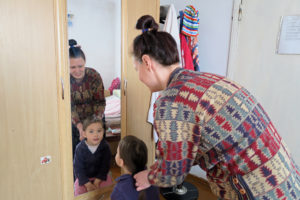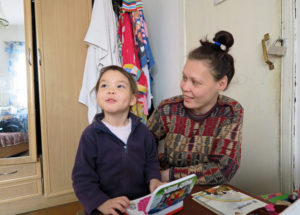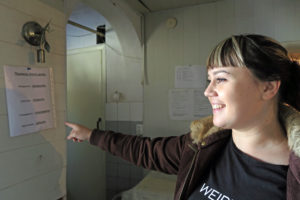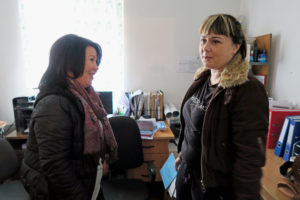
Author: Olesya Kravchuk, AFEW International
Five-year-old Sofia is playing with her mother’s telephone. The girl is sitting on the floor and is listening to the music. She is switching between the songs, watching videos, and trying to find her favourite track. There are four beds in a small room. At some moment, the girl puts the phone away and asks: “Mom, what will Santa bring me?”
“What would you like, dear?” she hears from her mother, and the broad smile appears on her face. “I would like him to bring me a kitten. I will feed it with milk.”
When the girl is smiling, she has cute dimples on her cheeks. She brings a toy – plastic alphabet with the buttons. She presses the letters and repeats them. Sometimes she gets the letters wrong, and then the mother asks her to do it again.
TELLS ABOUT HIV TO NEW FRIENDS
Sofia and her forty-year-old mother Leila live in the hostel that operates in the centre of adaptation and socialization of women – injecting drug users in the public fund Asteria in Bishkek, Kyrgyzstan. Leila was recently released from prison.

“I do not have any relatives; I was raised in the orphanage. I got to prison when I was pregnant, and my daughter was born there,” Leila tells. “Now I work in the kitchen or wash the floors. Recently I went to Turkey, and wanted to find a job there, but I do not know Turkish language, and that is why it did not happen. By education, I am a seamstress and a pastry chef, but it is hard to find a job because I am HIV-positive. I am being asked about my diagnosis all the time, and I always have to go through medical examinations. Now I have found a job as a nursemaid, but I do not have anyone to leave my daughter with. She has to go to kindergarten, but all of them here are not free of charge. I will have to spend almost whole salary to cover the pay for kindergarten… I am currently waiting for the cash advance to pay.”
Leila says that she tells her new friends about her diagnosis, even though she does not always want to do it.
“I think, people with my disease should talk about it, and warn others as well. Now I also bring other people to get tested. I am telling them they have to do it, and that it is free of charge,” Leila says. “Of course, people treat me different when I tell them about my diagnosis. Yes, it is unpleasant, but I am happy that in this way I do something nice to others. Everybody should know such things.”
PRAYING FOR ASTERIA
Leila is worried that the hostel in Asteria can be closed. In that case, the woman can end up on the street. She does not have anywhere to go to.
“I should not be complaining; we have everything here. The main thing is the roof over your head,” the woman smiles and hugs her daughter. “I am very comfortable here. We receive medical treatment, there is a place to sleep, to do laundry. Every Sunday we go to church. In the church I always pray for this house, for people who help us here, and ask God that the organization has donors.”

Leila says that she would like to move from the hostel in the future, but she does not have such possibility yet. She dreams of her own home, family, and work. She also wishes that the hostel will never close. People who work in Asteria have the same desire.
“We indeed often have problems with financing. Every year we do not know what to expect in the next one,” the head of the public fund Asteria Iren Ermolaeva says. “Our public fund is working since 2007, and the hostel – since 2009. We would like to have the whole range of services, but there is not enough financing these days. We know how to find the approach to women, we know how to create friendly atmosphere so that a woman would want to change her life for better herself, and we would like to use this knowledge. We feel sorry for our clients, and we would like to help them more.”
DREAMING ABOUT OWN HOUSE
Workers of Asteria also dream about purchasing the house where they will place the centre of adaptation and socialization of women – injecting drug users and the hostel. They have already found funds for the future house renovation, but cannot find money for its purchase.
“Then we would be able to have social entrepreneurship, maybe some little farm. In that way, we could at least not depend on donors in food,” the coordinator of the social services of the fund Tatiana Musagalieva is saying. “Until now, we rented all three houses for our centre.”

Thanks to “Bridging the Gaps: Health and Rights for Key Populations” project from Public Foundation “AIDS Foundation East-West in the Kyrgyz Republic”, in 2016 Asteria could support four beds in the hostel. The project also helped with medicine and warm food.
“People often come to us to eat, to do laundry,” Iren Ermolaeva says. “Around 300 women come through our centre during one year. Leila, for instance, came here after she was released from prison. She has got all the necessary services, clothes, shoes, and got medical examinations. Leila was imprisoned for five years, and, now, due to the conditions that we have, she adapts and integrates into society. In this way, she becomes more confident in herself, can find a job and build her future.”



